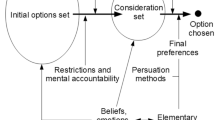Abstract
Consumer behavior theory, as it has largely evolved from economics with its rigid adherence to marginal utility theory, suggests that consumers are highly rational and that they basically strive to maximize utility or satisfaction by the careful rationing of resources. In this paper, the typical assumptions in consumer decision process models are reviewed and analyzed, the empirical evidence supporting the models of the rational consumer is challenged, the concept of rationalization is developed and the existential support for the concept is examined, the role and significance of alternative ego state on consumer decision processes are explained and finally, the rudiments of a revisionist approach to consumer behavior are advanced.
Similar content being viewed by others
References
Aronson, Elliot. 1969. “The theory of cognitive dissonance: A current perspective.” In Leonard Berkowitz (ed.)Advances in Experimental Social Psychology. 4. Academic Press.
Berlyne, D. E. 1960.Conflict. Arousal, andCuriosity. McGraw Hill Book Co., New York.
Berne, Eric. 1961.Transactional Analysis in Psychotherapy. Grove Press, New York.
Bowen, L. 1970.The Effects of Product Involvement on the Evaluation of Rational and Non rational Advertising Appeals. Unpublished master thesis, University of Wisconsin.
Bucklin, Louis P. 1965.The Information Role of Advertising. J. Advertising Research 5: 1–15.
Camus, Albert. 1955.The Myth of Sysyphus, and Other Essays. Vintage Books, New York.
Chaffee, Steven H. and Jack M. McLeod. 1973. “Consumer Divisions and Information Use,” pp. 354–385. In Scott Ward and Thomas S. Robertson (ed.)Consumer Behavior: Theoretical Scourses. Prentice Hall, Inc., Englewood Cliffs, N.J.
Coleman, James C. 1964.Abnormal Psychology and Modern Life. Scott Foreman and Co., Chicago.
Cox, Donald F. (ed.). 1967.Risk Taking and Information Handling in Consumer Behavior. Graduate school of Business Administration, Harvard Univ., Boston.
Fay, Brian. 1978. “Practical Reasoning, Rationality and the Explanation of Intentional Action,” pp. 76–99.J. for the Theory of Social Behavior. 8.
Ferber, Robert. 1967. “Research on Household Behavior.” InSurveys in Economic Theory, Ill. Macmillan Co., New York.
Festinger, Leon. 1957.A Theory of Cognitive Dissonance. Stanford Univ. Press. Palo Alto.
Gross, Alfred. 1974. “Psychological Blocks in Marketing,” pp. 61–72.Business Topics 22.
Hansen, Flemming. 1972.Consumer Choice Behavior: A Cognitive Theory. The Free Press, New York.
Harris, Thomas A. 1969.I'm OK-you're OK. Avon Books, New York.
Kaufman, Walter. 1973.Without Guilt and Justice: From Decidophobia to Autonomy. Peter H. Wyden, Inc., New York.
Kollat, David J. 1966. “A Decision-process Approach to Impulse Purchasing.” In R. M. Haas (ed.).Science, Technology, and Marketing. Amer. Marketing Assoc., Chicago.
Machlup, Fritz. 1962.The Production and Distribution of Knowledge in the United States. Princeton Univ. Press. Princeton, New York.
Markin, Rom J. and Chem L. Narayana. 1975.Behavior Control: Are Consumers beyond Freedom and Dignity? Assoc. for Consumer Res., Cincinnati, Ohio.
Nicosia, Francesco M. 1966.Consumer Decision Processes. Prentice Hall, Inc., Englewood Cliffs, N.J.
Preston, Lee. 1968. “Relationships among Emotional, Intellectual, and Rational Appeals in Advertising.”Speech Monographs 35: 504–511.
—. 1954. “The Nature and Meaning of Dogmatism.”Psych. Rev. 61: 194–205.
Rokeach, Milton. 1960.The Open and Closed Mind. Basic Books. New York.
Rothe, James T. and Lissa Benson. 1974. “Intelligent Consumption: An Attractive Alternative to the Marketing Concept.”Business Topics 22: 29–34.
Sarraute, Nathalie. 1963.Tropismes. Maria Jolas (tr.) 1967. G. Braziller, New York.
Sears, David O. and Jonathon L. Freedman. 1967. “Selective Exposure to Information: A Critical Review.”Public Opinion Quarterly 31: 194–213.
U.S. Office of Education. 1974. “Political Knowledge and Attitudes, National Assessment of Educational Progress, pp. 11–12.Compact.
Venkatesan, M. 1973. “Cognitive Consistency and Novelty Seeking,” pp. 354–385. In Scott Ward and Thomas S. Robertson (ed.),Consumer Behavior: Theoretical Source. Prentice Hall, Inc., Englewood Cliffs, N.J.
Author information
Authors and Affiliations
Additional information
An earlier draft of this paper entitled “Consumer Decision Processes: The Role and Influence of Rationalization” was presented at the annual meeting of The American Psychological Association Division 23 in 1977. The author was assisted in the preparation and development of this earlier draft by Dr. Chem Narayana. This assistance is herewith acknowledged.
Rights and permissions
About this article
Cite this article
Markin, R.J. The role of rationalization in consumer decision processes: A revisionist approach to consumer behavior. JAMS 7, 316–334 (1979). https://doi.org/10.1007/BF02729682
Issue Date:
DOI: https://doi.org/10.1007/BF02729682




